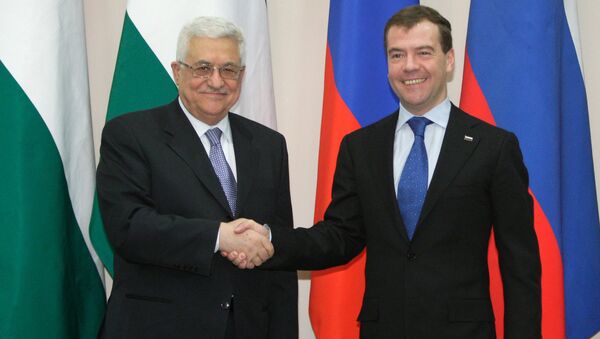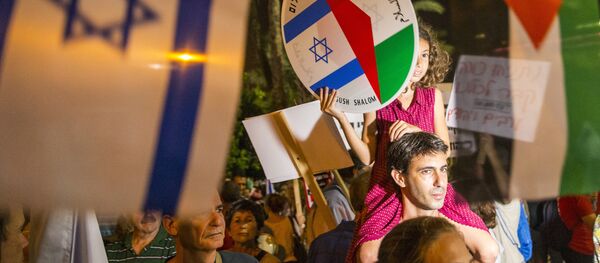Medvedev and Abbas are set to discuss bilateral issues and Middle East situation.
ESTABLISHMENT OF RUSSIAN-PALESTINIAN RELATIONS
The Soviet Union and Palestine established official relations in 1974, when the Palestine Liberation Organization opened its mission in Moscow.
On November 18, 1988, the Soviet Union officially recognized the State of Palestine that was proclaimed three days earlier in Algeria at a session of the Palestinian National Council.
In January 1990, the Palestinian mission in Moscow was transformed into the Embassy of the State of Palestine, headed by an ambassador.
The Palestinian National Authority was established in May 1994, bringing Russian-Palestinian relations to an inter-state level.
In August 1995, Russia opened its mission at the Palestinian National Authority in Gaza. In March 2004, the mission relocated to Ramallah.
OFFICIAL VISITS
On January 30, 2005 Palestinian Leader Mahmoud Abbas paid his first foreign visit to Russia.
In 2005-2013, he visited Russia ten times, including regions of Chechnya, Dagestan, Tatarstan, Bashkortostan, Chuvashia and Karachayevo-Circassia.
On April 29, 2005, Russian President Vladimir Putin became the first acting national leader to visit the Palestine. During talks with President Abbas, the Russian side reaffirmed its intention to "continue assisting Palestine in its efforts to assert statehood," as well as in developing economic projects, including those in the Gaza Strip.
In February 2007, Abbas and Putin met in Amman, Jordan, during Russian leader’s Middle East tour.
On January 18, 2011, Russian President Dmitry Medvedev paid a working visit to Jericho, Palestine. The parties discussed the Middle East peace settlement, regional issues and prospects for convening a peace conference on the Middle East in Russia. Medvedev and Abbas also discussed economic aspects, including trade, investment projects, tourism and agriculture.
On June 26, 2012, Russian reelected President Vladimir Putin visited Palestine for the second time. Putin and Abbas held talks at Abbas’ Bethlehem residence and discussed the Palestinian-Israeli peace process, the restoration of intra-Palestinian accord, as well as bilateral cooperation.
The Russian and Palestinian leaders have been maintaining regular contacts over the past few years.
In particular, they held bilateral meetings twice in 2014 (in January and June), and twice in 2015 (in April and September).
On April 18, 2016, Abbas paid a working visit to Russia. Putin and Abbas met in the Kremlin and discussed topical issues of the Russian-Palestinian agenda. As usual, they focused on prospects for the Palestinian-Israeli negotiating process.
Russian Foreign Minister Sergey Lavrov visited Palestine in September 2004, October 2005, September 2006, June 2007, March 2008, February 2009 and June 2010 during his working trips to the Middle East countries.
Besides, Lavrov meets with Abbas each September during the UN General Assembly sessions in New York.
BILATERAL AGREEMENTS
Russia and Palestine signed a number of inter-governmental and inter-departmental agreements, including an agreement on education cooperation (1988), an agreement on cultural and science cooperation (1994), an agreement on trade and economic cooperation (1998) and a cooperation agreement between the Russian Audit Chamber and the State Audit and Administrative Control Bureau of the Palestinian National Authority (2008). Their implementation, however, is hampered by the complicated regional situation.
On April 13, 2015, during Abbas visit to Russia, the parties established an inter-governmental Russian-Palestinian commission for trade and economic cooperation. This cooperation format replaced the high-level working group for holding consultations on economic and investment issues. The commission is co-chaired by Russian Minister of Labor and Social Protection Maxim Topilin and Palestinian National Economy Minister Abeer Odeh.
On March 14-15, 2016, Ramallah hosted the commission’s first session.
ECONOMIC COOPERATION
According to the Russian Ministry of Economic Development, there is almost no investment cooperation, trade and economic ties between Russia and Palestine. Abbas explains the low bilateral trade turnover, estimated at about $1 million annually, by restrictions stipulated by 1994 Paris Agreement, envisaging an agreed-upon framework of Palestine’s economic and foreign trade operations by Israel.
Nevertheless, bilateral trade has been steadily expanding in the past few years. It has increased almost six-fold over the last five years, and reached $3.4 million in 2015.
COOPERATION IN OTHER SPHERES
Russia and Palestine actively cooperate in such spheres as education, culture and tourism.
Since the 1970s, Russia has been allocating federal-funded state stipends to Palestinian students at Russian universities.
In October 2010, the Administrative Directorate of the Russian President helped to finish construction of the museum and park complex in Jericho.
In June 2012, Putin and Abbas officially opened the Russian Center of Science and Culture, as well as a guest house for Orthodox Christian pilgrims in Bethlehem.
Russia also financed the renovation of the Church of the Nativity in Bethlehem. The Imperial Orthodox Palestine Society headed by Sergey Stepashin has become quite active nowadays, implementing educational, cultural and research projects. The Society is trying to promote tourism in Palestinian territories, mostly in Jericho, Bethlehem, Hebron and East Jerusalem.




